Startups, the energising force at India Two-Wheeler Inc
Experts were rather optimistic about the potential of startups, especially in the EV space, provided they maintained their focus on execution and offering quality product and services.
The start-ups in the mobility business continue to attract attention and investor interest. Especially, in the backdrop of the Covid-led slowdown globally, it is interesting to note how entrepreneurs are tweaking their business philosophies to create a sustainable model. Experts predict that there is considerable potential for success if the entrepreneurs stick to, what they call the 5S of modern mobility, Smart, Small, Shared, Sustainable and safe.
The final session of the Autocar Professional’s Two-Wheeler Virtual Conclave, focussed on ‘role of start-ups in shaping the future of the two-wheeler industry’. As it happens, most start-ups in the automobile sectors are in the electric vehicle space. Coming on the back of the discussions on companies riding the EV megatrend across India Auto Inc, it was interesting how localisation and quality came across as the key ingredients for success. The panel of industry veterans comprised of stake holders across the two-wheeler space-
- RL Ravichandran, Two-wheeler industry veteran & a start-up mentor
- Hemlatha Annamalai, Global Chair, TIE Woman
- Jeetender Sharma, Founder & MD, Okinawa Autotech
- Amit Gupta, Co-founder & CEO, Yulu
- Mohan Ramasamy, Founder & CEO, Srivaru Motors
Autocar Professional’s Executive Editor, Sumantra Bibhuti Barooah moderated the session.
Start-up mentor RL Ravichandran: ‘Anxiety of range, power, fuel and battery needs to be addressed for meaningful progress in EV adoption’
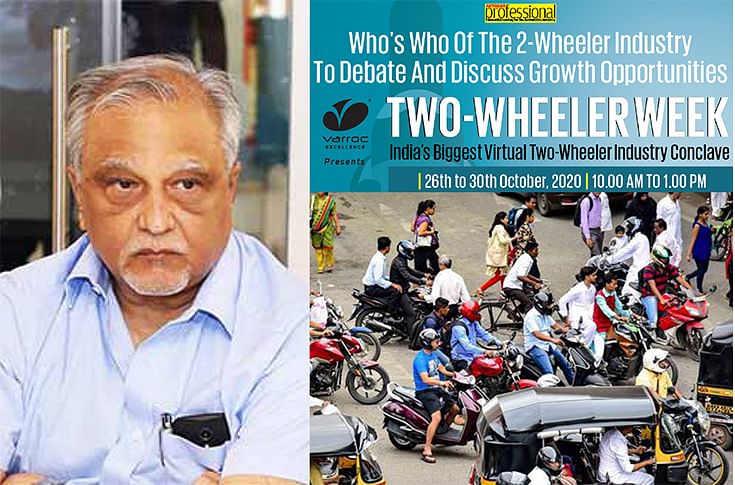
Two-wheeler industry veteran and a start-up mentor, RL Ravichandran kicked off the discussion on a positive note with the opening comments that he sees a strong potential for start-ups in the two-wheeler industry. Taking cognizance of the fact that a large number of startups in the two-wheeler segments are in the EV space, Ravichandran says, “Cost of transition, value for money, addressing anxiety along with brand perception to help in greater conversion to EVs.”
According to him, “Not many manufacturers yet who are good at production of motors, see growth potential for EV suppliers going forward, especially the BMS. I think adoption to a new technology by the country is a long journey, not achievable overnight. Eventually it is the brand that stands out.”
The EV transition is primarily based on Government policies and environmental concerns. Ravichandran feels, “two-wheelers are becoming the stepping stone for EV adoption. India has capacity to produce 20 million two-wheelers, more than 90% adopted for daily commute by customers. We have got volume and capacity. See possibility of greater EV adoption by virtue of these factors.”
However Ravichandran pointed out that the, “anxiety of range, power, fuel and battery needs to be addressed for meaningful progress in EV adoption.”
The start-up mentor highlighted that the, “Brands enhance the perception of a consumer, critical for converting consumers into buyers.”
With many background players working towards the mass adoption of EVs in future, Ravichandran said given the, “high benchmark, heavy investment, mega consumption and support for customers and service and address anxiety will empower transition to EVs.”
TIE Woman’s global chair Hemlatha Annamalai: ‘Startups need to have good mentors and a proper business model’
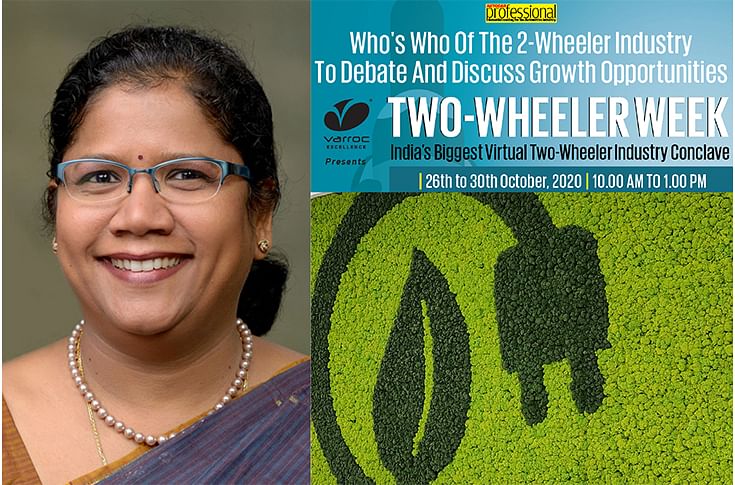
Ampere Vehicles was one of the pioneers in the Indian EV space. Hemalatha Annamalai, founder of Ampere Vehicles, said: “Women need to come into this industry. Start-ups are still not a level-playing field for women. At TIE, we are trying to engage and have reached out to 3,000 women. If we can create 1,000 women entrepreneurs it makes a huge difference.”
Being the early movers in the space, there were a lot of myths while entering this segment. Though things have started to change now, there needs a push to make this happen. “There was a lot of myth about EVs about the load they can could carry, the pulling capacity and the travel range. But things have changed now. As an entrepreneur and start-up, I am keen to drive a change in EVs as a disruptive innovation. A start-up entrepreneur has to have a good business model. Many newbies bite off more than what they can chew. We at Ampere, started slowly with a focussed market and expanded later. Nowadays, startups take huge steps without a proper model. They need to have good mentors and a proper business model,” Hemalatha said.
She pointed out that startups should not worry about a brand. According to her, with a proper vision and mission, a natural progression will happen. Giving an example of her own company, she said they built everything right from the bottom and a focussed execution was crucial for their development.
“There needs to be clarity on what should be done. For the first six years since our launch, we had a small market. When you do not have a big margin to play it does not mean to scale up. Scales and cash flows are the paramount responsibilities of start-up promoters. Also, the consumer market is very different,” she mentioned.
“My advice to EV start-ups and entrepreneurs would be, 'Just go for it'. There is a huge market out there in India, waiting to be captured. I see lots of scope and potential for EV entrepreneurs in India but focussed execution is key,” she concluded.
Okinawa Autotech’s Jeetender Sharma: ‘Only high-speed e-two-wheelers can replace ICE products.’
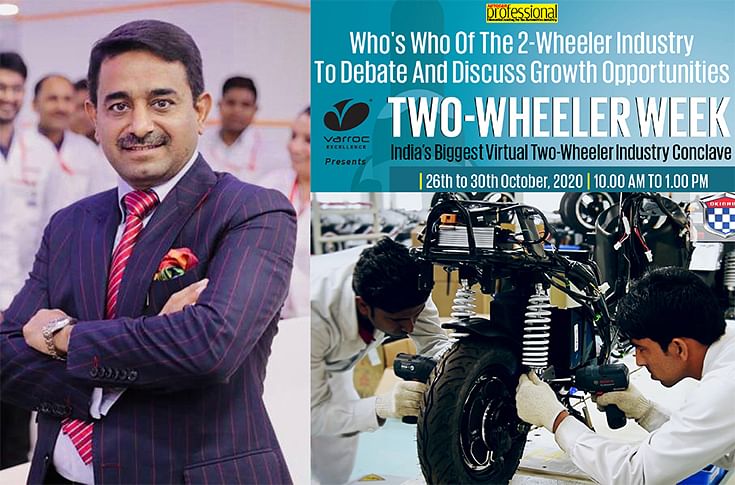
Green can also be mean, and it’s a mantra Gurgaon-based electric scooter maker Okinawa Autotech follows. For a company which has sold 1,836 high-speed electric two-wheelers in the April-September 2020 period (24%), just behind market leader Hero Electric, it is understandable that it is bullish on speedy EVs on two wheels.
As a start-up, the company has seen a rather speedy rise – in FY2020, it was the No. 1 player in high-speed electric scooters with sales of 10,133 units, ahead of Hero Electric (7,399). But it’s taken guts, grit and gumption to get there, says company founder and MD, Jeetender Sharma. Not many know that Sharma has over two decades of experience working with global OEMs, which he says has helped Okinawa focus on product development where quality, cost and delivery are accorded prime importance.
Okinawa, the first e-two-wheeler OEM to secure FAME II approval, has achieved a high level of localisation. “We have over 90% localisation now – that means we have good command over product quality, spare parts and service. Localisation facilitates a stronger supply chain network. We have established our dealerships across India as well as a reliable supply chain. That’s why we can offer our customers good support and the confidence to buy our products.”
Will 98-99% localisation be achievable? An optimistic Sharma said, “Okinawa was incepted in 2014 and we launched our first product in 2017; that was the time taken to establish our local supply chain in India. It is not possible to switch supply chain overnight; it takes 3-4 years to source and validate quality and components. But it is possible. Suppliers of ICE vehicle components are capable to making EV parts too, even the motor controller and battery, which are mainly sourced from China. There will be a number of new players over the next 2-3 years.”
Sharma is all for high-speed two-wheelers, saying that “I see mushrooming of plug-and- play operators in slow-speed EVs as the norms are not very stringent. But the government and consumers will soon realise high-speed EVs are game-changers. The transition to EVs is possible with reasonable high-speed alternatives to ICE variants.”
He added, “Buying a vehicle in India is a family – and safety-driven – decision. Only when high-speed electric two-wheelers can replace IC-engined two-wheelers. Our forte is high-speed scooters –we have three of them and three low-speed products, the latter because some of our dealers and customers want this type. Our upcoming high-speed motorcycle is also going to be very much localised. The perception about electric two-wheelers is changing fast in India. Increasing innovation incorporating electronics are making EVs more connected, adding to their appeal. More innovative platforms are a big plus too," explained Sharma.
He is of the opinion that while there continues to be a level of dependency for certain products and materials for EVs, it is possible for OEMs to establish alternative sourcing in India. “Start-up is the foundation for tomorrow, helping create more awareness about EVs. This is the right time for vehicle electrification in India.”
Yulu’s Amit Gupta: ‘We’re developing a world-class e-bike with Bajaj Auto.’
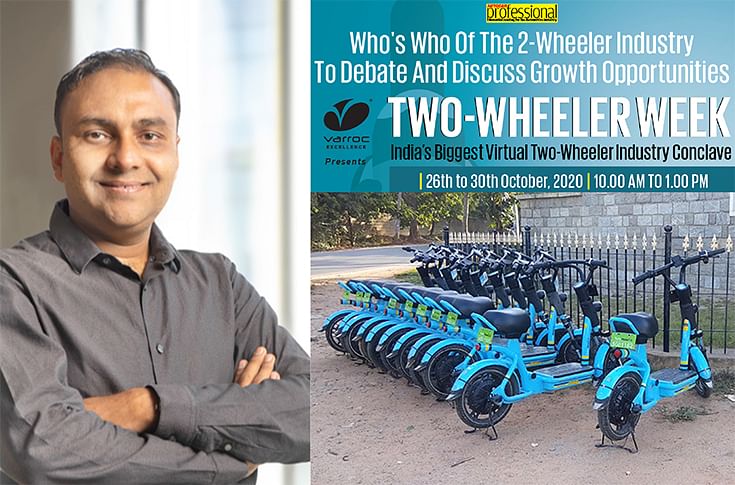
If a motorcycle major like Bajaj Auto feels it fit to invest in a Bangalore-based start-up, then Yulu Bikes must be doing something right. According to Amit Gupta, co-founder and CEO, it’s probably the company’s 5S mission – Smart, Shared, Small, Sustainable and Safe – is what drew the Pune-based company’s MD Rajiv Bajaj to them.
The overarching aim of the start-up, when incepted three years ago, is to bring down traffic congestion and enhance the air quality in polluted Indian cities. Gupta reminisces: “ When we started, there were lot of challenges – no relevant vehicles for shared mobility, or a battery designed specifically for Indian conditions. So we began working towards filling the gaps. Thankfully Bajaj Auto came onboard.”
In November 2019, Bajaj Auto invested Rs 58 crore in Yulu. As part of the understanding, Yulu will source electric two-wheelers from Bajaj Auto, which will been co-designed and manufactured exclusively for shared micro-mobility. In addition, Bajaj will also consider facilitating the vehicle finance needs of Yulu for large scale deployment of its micro-mobility electric vehicles. Interestingly, Gupta revealed that the first Yulu-Bajaj product will roll out next year.
According to Gupta, “Everyone is talking about sustainability, which is a global phenomenon; Covid-19 has only added to the momentum. E-mobility calls for many partnerships – we realised we cannot make a world-class product by ourselves and we met various stakeholders. Fortunately, our idea clicked with Rajiv Bajaj.”
Gupta says Yulu has already achieved success in the markets it operates in. “In the B2B segment, our electric two-wheelers which come with a small portable battery, IoT, and battery swapping, have helped create a financially viable business model. A few companies who attempted this with ICE vehicles failed.”
The past few years have been an enriching experience. “We bought our first 10,000 vehicles through equity money. Now, after two years of operations, we have a sound track record and understanding of the business, along with plentiful of data. We have invested a lot of money on R&D, which we plan to monetise in the coming years. We have been operationally profitable since the past two years, and will be EBITDA- positive by end-2021. Our new world-class product with Bajaj Auto will address the problem statement that exists in the e-two-wheeler market – it will offer far superior in terms of product per se and safety and is targeted at both Indian and global consumers. It will be manufactured by Bajaj Auto,” said Gupta.
Srivaru Motors’ Mohan Ramasamy: ‘Startups will bring in lot of innovation and disruption, direction and focus to determine the final success.’
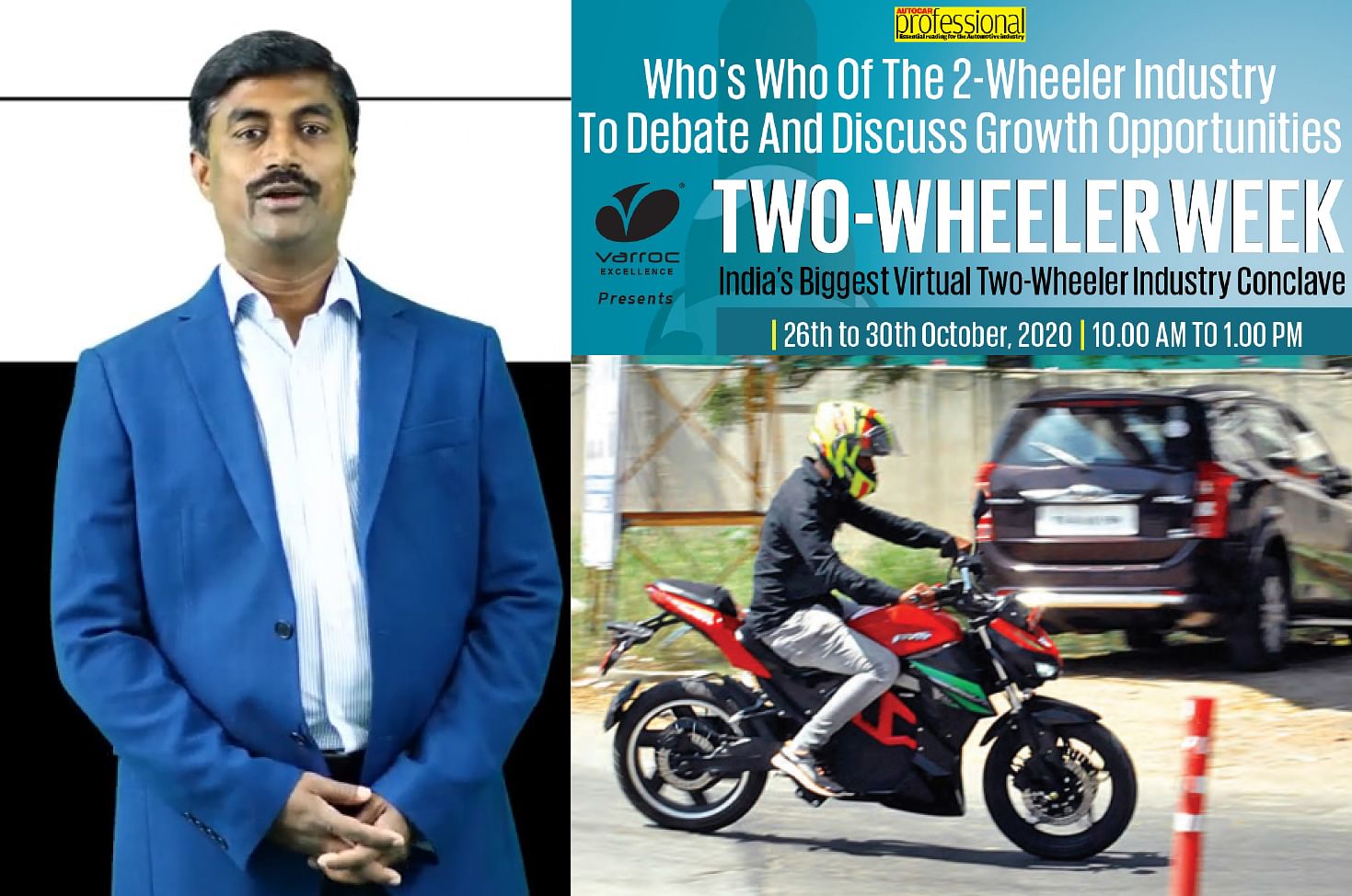
“The quality of the product and service to the customer is the primary priority for developing a successful and sustainable business model. The system needs to scale up for the start-up to succeed," said, Mohan Ramasamy, founder of Srivaru Motors. A newbie in the EV market space, the Coimbatore based company is already making waves in the EV space with their Prana bike. At the company, they are attempting a backward integration process.
Ramasamy pointed out that, “Startups will bring in lot of innovation and disruption, direction and focus to determine the final success.”
He mentioned that a cost analysis model is crucial for EV dealers. The 3S (Sales, Service and Spares) will be very important in the market. “Sale of EVs and the spares will bring in money. But the service part is not a big-money business. We ask the dealers in EV not to invest hugely in service as it can be distributed. Around 80% of service will be on-demand and the remaining 20% of complex service will come to the dealer. Also, a much lower investment will be required to set up dealers as we do not want to put mass dealers at a single place,” he mentioned.
“I am asking ACMA to help me manufacture components in the same factories where parts for Bajaj Auto and TVS Motor Co are made,” he signed off.
All in all, the experts were rather optimistic about the potential of startups, especially in the EV space, provided they maintained their focus on execution and offering quality product and services.
Today's webinar was the last in the series and proved to be the talking point of the industry in the last week of October.Au tocar Professional thanks all the panellists, webinar attendees in India and overseas, and sponsors — Presenting Partner Varroc; Technology Partner DSM Engineering Materials; and Associate Partners KPIT Technologies and Automotive Test Systems — for making India’s first-ever week-long virtual two-wheeler conclave a huge success.
Also read
Localised EV ecosystem critical to industry growth
Affordable safety tech vital for India's two-wheeler industry: Experts at AutocarPro webinar
RELATED ARTICLES
Cosmo First diversifies into paint protection film and ceramic coatings
The Aurangabad, Maharashtra-based packaging materials supplier is leveraging its competencies in plastic films and speci...
JSW MG Motor India confident of selling 1,000 M9 electric MPVs in first year
The 5.2-metre-long, seven-seater luxury electric MPV, which will be locally assembled at the Halol plant in Gujarat, wil...
Modern Automotives targets 25% CAGR in forged components by FY2031, diversifies into e-3Ws
The Tier-1 component supplier of forged components such as connecting rods, crankshafts, tie-rods, and fork bridges to l...






 30 Oct 2020
30 Oct 2020
 12358 Views
12358 Views





 Autocar Professional Bureau
Autocar Professional Bureau




